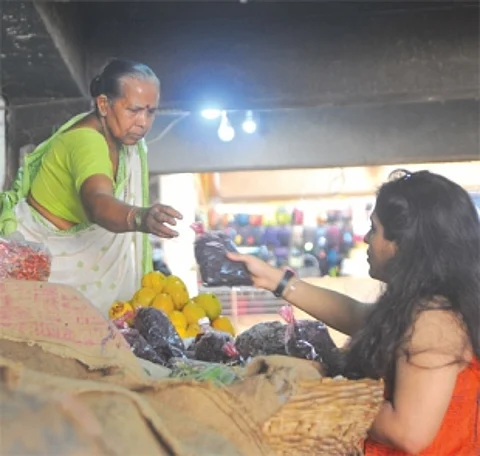

“Purument? Who does it now?” is a common statement one hears when you ask someone if they have
started buying food items. Though it might seem that modern Goa is moving away
from the notion that food items need stocking up, as they are available
throughout the year, the flourishing Purument markets say otherwise. The
annual feasts that are held in different parts of Goa still receive great
response, as buyers enthusiastically buy packets of kokum sollam or
dried prawns sukhi sungtam. And it is no longer only Goans living in
Goa, but even those who are travelling abroad, who are buying these little
packets of foodie treasures.
Purument comes from Portuguese word provisão which
means provisions or supplies. The Feast of Holy Cross, Santa Cruz which was
held on May 6, 2018, saw the first of the annual Purumentache fests.
This was followed by the Feast of the Ascension of Jesus Christ into Heaven,
which is also famous for its annual Purumentache Fest, at the Our Lady
of the Immaculate Conception Church, Panjim, held on May 12, 2018. The next Purumentache
fest will be held at Holy Spirit Church, Margao, which will be celebrating
its annual feast on May 20, 2018.
The tradition of Purument dates back centuries, to when
Goans didn’t have any means of preservation, in terms of refrigerators, and
would find it difficult to source these food items in the monsoons. Markets
would be flooded in the summer with food items that were dried, pickled, or
salted. The Mapusa market, which is famous for its Friday market, continues to
see a huge flow of customers still eager to buy these food items ranging from
dried fish, to fruits and vegetable, and even medicines. Some of the items
which make it to the list include dried red chillies, pork sausages or chourizo,
bunched onions kanyacho movlyo, kokum sollam, salted fish khare,
small dried prawns galmo, pickled mackerels or para, dried mango slices
ambeachi solla, dried prawns sukhi sungtam, pickled vegetables and fruits,
beans alsane, ragi nashne, rice for kanji pezache tandul,
pulses, rock salt, jaggery, papad, pickles, jams, and wines.
The tradition of Pavsacho Purument is very much alive.
People still buy food like parra, balchao, masala bombils (Bombay
ducks) and different types of masalas. Goans love eating fish, and in the rainy
season when it is pouring so heavily, their tastes are satisfied with pickled
or dried fish.
Dr Enid Miranda from Margao says, “I buy dried red chillies and
salt fish because you don’t get fresh fish in the monsoons.” Fatima D’Cruz, a
housewife from Panjim says, “I make it a point to buy the bunched onions which
are locally grown and parra which is very tasty. Goans love fish and in
the rains even a small piece of fried parra is enough to satisfy our
appetite.”
For the first time, this year, members of a Facebook page
decided to organise a Purument bazaar in Panjim. With over 85,000 members,
the stalls have already been booked for Foodomania Purument Bazaar which
will be held on May 26 and 27, 2018 at Institute Menezes Braganza in Panjim.
Goan Foodomania Purument Bazaar will be hosted by Goan Foodomania in
collaboration with Institute Menezes Braganza. Ashwini Kamat Tendulkar, founder
admin of the group, came up with the idea for the members of the group to sell
their homemade Purument stocks through this bazaar.
The members mostly comprise of women who love to share their
love for Goan cooking with others, and they are bringing creative ideas
literally to the table, for this market! “There are many women entrepreneurs
who are Goans, as well as those from Kolhapur and Malvan living in Goa, who
will be keeping their food items for sale. This market is exclusively for
Purument and so one will be able to buy items like kokum, papad,
pickles, jambul and grape wines, jackfruit and mango saath and
various masalas,” says Ashwini from Ponda.
While
there are still a few people who think that stocking up for the monsoons
doesn’t make sense since most of the food items are available throughout the
year, with the frequent power cuts still haunting Goa, you never know when you
will have to rely on a sukhe sungatachi koddi served with piping hot
boiled red rice, in the pouring rain!